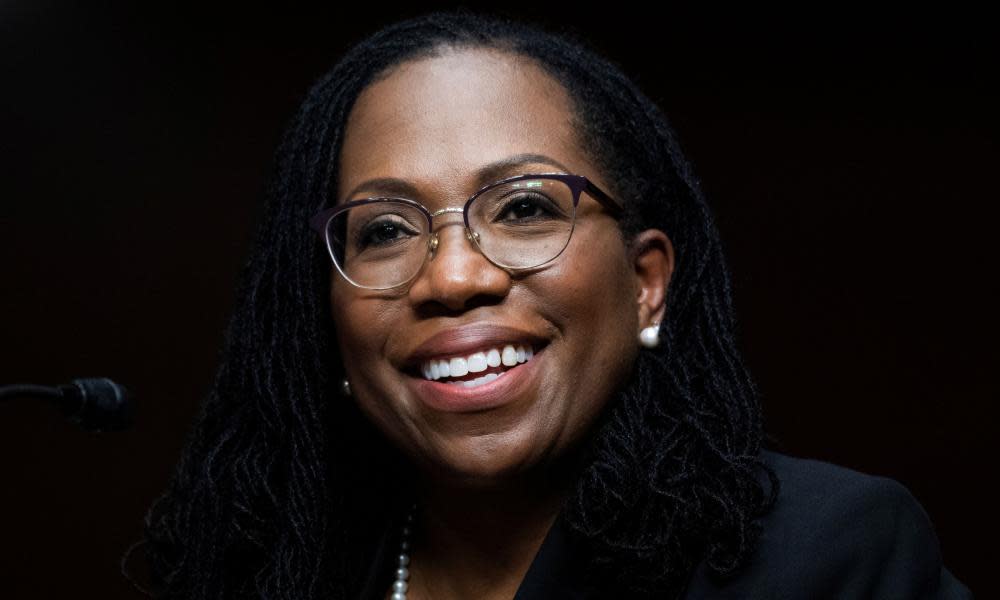Ketanji Brown Jackson’s nomination is rare moment of celebration for Biden

- Oops!Something went wrong.Please try again later.
- Oops!Something went wrong.Please try again later.
- Oops!Something went wrong.Please try again later.
Two years ago exactly, Joe Biden stood on a debate stage in Charleston, South Carolina, his candidacy on the ropes, and made a promise: if elected president, he would nominate the first Black woman to the supreme court.
Days later, Biden won the South Carolina primary on the strength of his support among Black voters. The victory propelled him to the Democratic nomination and then to the presidency. Last month, Justice Stephen Breyer announced his retirement, presenting Biden with an opportunity to fulfill that campaign commitment.
Related: Ketanji Brown Jackson: who is Biden’s supreme court choice?
On Friday, Biden stood before a podium in the White House’s Cross Hall to nominate Judge Ketanji Brown Jackson to supreme court, declaring that the highest court in the land should reflect “the full talent and greatness of our nation”.
If eventually confirmed by the senate, she will be the first Black woman to serve on the supreme court in its 232-year history.
It was a rare moment of celebration for Biden, embattled on nearly every front. His once hugely ambitious domestic agenda is stalled, perhaps permanently; the Democrats’ tenuous control of Congress faces historic headwinds in this year’s midterm elections; and the international order that Biden spent much of his political career defending faces its gravest threat in decades after the Russian invasion of Ukraine.
But the nomination of a supreme court justice is one of the most enduring acts of any president’s legacy. And for Biden, it is particularly resonant.
Biden has said that he hopes the diversity he has brought to the federal government will be long-lasting. After serving as the vice-president to the nation’s first Black president, he chose Kamala Harris to be his running mate, which led her to become the first Black and Asian American woman to serve as vice-president.
His cabinet is the most diverse in US history. And in his first year, Biden nominated a record number of district and appeals court judges from a range of racial, ethnic, geographical and legal backgrounds.
Black voters, and Black women especially, were the driving force behind Biden’s nomination and his presidency. According to exit polls in 2020, Black women were his most loyal supporters, with 90% casting their ballots for him.
In January 2021, Black female organizers in Georgia helped Democrats win two Senate runoff elections, cementing the party’s control of the chamber and delivering to Biden narrow but meaningful congressional majorities.
Yet Biden has failed to enact much of his racial justice agenda. Democrats failed to overcome a Republican filibuster of voting rights legislation, designed to combat the raft of restrictive voting laws being enacted by conservative legislatures across the country. Attempts at policing reform sputtered last year, while the economic provisions of his Build Back Better agenda intended to combat soaring income inequality remain stalled in the Senate amid opposition from his own party.
In that sense, Jackson’s nomination is a rare opportunity for Biden to make good on a promise to Black women.
Democrats alone could confirm Jackson to the supreme court, with Harris breaking the tie. When Jackson was confirmed to the appeals court last year, she won the support of three Republican senators. But one of them, Senator Lindsey Graham, already criticized her nomination, saying it was a sign that the “radical left has won President Biden over yet again”.
But for many, and especially for Black women, Jackson’s nomination, at the end of Black History Month, was a moment of vindication and pride.
“She is eminently qualified to serve our nation on our highest court,” said Harris, a former federal prosecutor. “And while she will be the first Black woman on the supreme court, Judge Jackson will not be the last.”
Barack Obama, who nominated Jackson to serve as a district court judge in Washington DC, said the judge had “already inspired young Black women like my daughters to set their sights higher and her confirmation will help them believe they can be anything they want to be”.
In a statement announcing his decision to nominate Jackson, Biden recalled a formative exchange between a teenage Jackson and her high school guidance counselor.
When Jackson, the daughter of public school teachers whose parents grew up in the segregated south, told her counselor that she wanted to attend Harvard, the counselor warned her that she should not set her expectations “so high”.
“That didn’t stop Judge Jackson,” Biden said. Jackson graduated at the top of her class from Harvard College, then attended Harvard Law School, where she excelled as an editor of the Harvard Law Review.
Now, she is poised to make history as a supreme court justice.

